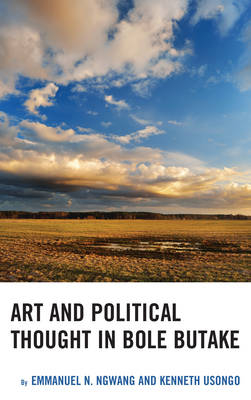
Art and Political Thought in Bole Butake
Lexington Books (Verlag)
978-1-4985-3810-7 (ISBN)
The study opens with an overview of the historical and social milieu that feeds Butake’s imagination and the introduction is followed by an interview of the playwright in which he explains his mission as a writer. The next two chapters appraise the political symbolism of Butake’s plays and chapter five undertakes a comparison of the colonial legacy and the culture of corruption in Butake’s Lake God and The Rape of Michelle.
Women in Butake’s imaginative universe play a non-negligible role in change. They are portrayed as political and social activists in their challenge to autocratic rule. This is the leitmotif of chapter six, which highlights the contribution of women towards political change in Cameroon.
In chapters seven and eight, the focus is on articulating the cultural signification of Butake’s plays in terms of political change. Concomitantly, these chapters also demonstrate Butake’s seamless incorporation of elements of oral literature in his drama, as he interpolates proverbs, divinations and other elements of orality in his work. Chapter nine of the book points out how Butake foregrounds the character traits of his protagonists against the backdrop of traditional Noni religion as well as Christianity. Thus, the bigotry and belligerence of both the Fon and Father Leo in Lake God, for example, are projected through a supernatural frame.
The conclusion appraises the contemporaneity of Butake’s drama. His oeuvre continues to inspire so many people: from disenfranchised groups that see in his drama a path to reclaiming liberties and to critics who are challenged to hone their literary tools in the endeavor to situate his works within the dynamics of politics and culture in Africa.
Emmanuel N. Ngwang is professor of English and the director of the Quality Enhancement Plan (QEP) at Texas College. Kenneth Usongo is associate professor of English at Texas College.
Chapter 1: Contextualizing Butake
Chapter 2: Interview with Professor Bole Butake, Dramatist and University Professor who
Refused to be “Lapiroed.”
Chapter 3: The Political Dimensions of Lake God and Other Plays
Chapter 4: Re-Configuration of Colonialism in Postcolonial Cameroon in Bole Butake’s Plays
Chapter 5: Colonial Legacy and the Culture of Corruption in Lake God and The Rape of Michelle
Chapter 6: Female Empowerment and Political Change in Lake God, The Survivors, and And Palm Wine Will Flow
Chapter 7: Symbol and Meaning in Lake God and Other Plays
Chapter 8: From Spoken to Texture: Orality in Lake God
Chapter 9: Character and the Supernatural in Lake God
Chapter 10: Conclusion and Butake’s Legacy
| Erscheinungsdatum | 04.10.2016 |
|---|---|
| Verlagsort | Lanham, MD |
| Sprache | englisch |
| Maße | 157 x 238 mm |
| Gewicht | 372 g |
| Themenwelt | Literatur ► Lyrik / Dramatik ► Dramatik / Theater |
| Geisteswissenschaften ► Sprach- / Literaturwissenschaft ► Anglistik / Amerikanistik | |
| ISBN-10 | 1-4985-3810-X / 149853810X |
| ISBN-13 | 978-1-4985-3810-7 / 9781498538107 |
| Zustand | Neuware |
| Informationen gemäß Produktsicherheitsverordnung (GPSR) | |
| Haben Sie eine Frage zum Produkt? |
aus dem Bereich


